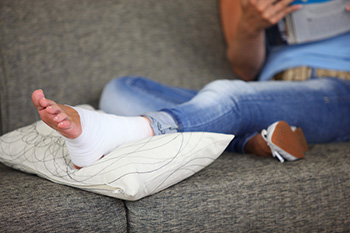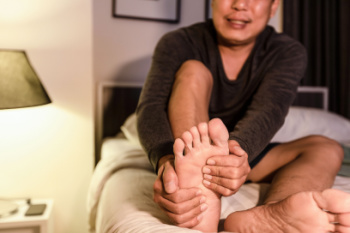
As people age, the feet often experience changes that can lead to discomfort and mobility issues. Elderly individuals frequently develop bunions, which are bony bumps that form at the base of the big toe and can cause pain, swelling, and difficulty with footwear. Thickened or discolored toenails are also common and may be caused by fungal infections or difficulty with proper nail care. Corns, which are areas of thickened skin from repeated pressure or friction, can lead to tenderness and a burning sensation. These foot problems may affect balance and increase the risk of falls. Symptoms such as aching, stiffness, or visible deformities should not be ignored. If you are elderly and notice any changes to your feet, it is suggested that you contact a podiatrist who can provide a proper diagnosis and offer appropriate treatment solutions.
If you need your feet checked, contact Corinne R. Kauderer, DPM of Dyker Heights Foot & Ankle. Our doctor will attend to all of your foot and ankle needs and provide you with quality treatment.
Geriatrics and Podiatry
When people age, some common issues that may occur are bone density loss, dry skin, poor circulation, and rough brittle nails. These issues may also affect your foot health if the necessary steps are not taken to alleviate the problems.
It is important to take care of your feet because feet that are injured or diseased can affect your overall health. Having painful feet hinders your ability to do daily activities or may decrease your willingness to do the things that you need to do.
Visiting Your Geriatrician
As we age, health problems become more likely, so it is essential to visit your doctor for check-ups to ensure that you are doing the best you can to take care of your health. It is recommended to check your feet frequently for any possible cuts, bruises, swelling, corns or any other irregularities.
Taking Care of Elderly Feet
Cracked or dry feet can be treated by applying moisturizer often. It is also important not to wear old socks because the older the sock is, the higher the possibility there will be that there is bacteria there. Wear fresh socks and make sure they fit properly.
Proper foot health means that you can have a more active lifestyle and you will not be bogged down by pain. Foot health also leads to good circulation, which is paramount for overall health.
If you have any questions, please feel free to contact one of our offices located in Brooklyn, NY and Old Bridge, NJ . We offer the newest diagnostic tools and technology to treat your foot and ankle needs.

Ankle sprains occur when the ligaments that support the ankle stretch too far or tear, often due to the sudden twisting or rolling of the foot. Recovery time for a sprained ankle varies depending on its severity. For instance, a mild ankle sprain, involving slight overstretching, may heal in one to three weeks, but a moderate sprain, which includes partial tearing of the ligaments, usually requires three to six weeks of healing. Severe sprains that involve a full tear of the ligament can take up to three months or even longer to recover, especially if surgery is necessary. Healing time can also be affected by a person's age, body weight, activity level, and any previous ankle injuries. Trying to walk on an injured ankle too soon or ignoring symptoms can prolong the recovery timetable and lead to chronic ankle instability. A podiatrist can assess the extent of the sprain, confirm the diagnosis with imaging as needed, and develop a treatment plan that protects the ankle and promotes full healing. If you have injured your ankle, it is suggested that you make an immediate appointment with a podiatrist for an exam, diagnosis, and treatment.
Ankle sprains are common but need immediate attention. If you need your feet checked, contact Corinne R. Kauderer, DPM from Dyker Heights Foot & Ankle. Our doctor can provide the care you need to keep you pain-free and on your feet.
How Does an Ankle Sprain Occur?
Ankle sprains take place when the ligaments in your ankle are torn or stretched beyond their limits. There are multiple ways that the ankle can become injured, including twisting or rolling over onto your ankle, putting undue stress on it, or causing trauma to the ankle itself.
What Are the Symptoms?
- Mild to moderate bruising
- Limited mobility
- Swelling
- Discoloration of the skin (depending on severity)
Preventing a Sprain
- Wearing appropriate shoes for the occasion
- Stretching before exercises and sports
- Knowing your limits
Treatment of a Sprain
Treatment of a sprain depends on the severity. Many times, people are told to rest and remain off their feet completely, while others are given an air cast. If the sprain is very severe, surgery may be required.
If you have suffered an ankle sprain previously, you may want to consider additional support such as a brace and regular exercises to strengthen the ankle.
If you have any questions please feel free to contact one of our offices located in Brooklyn, NY and Old Bridge, NJ . We offer the newest diagnostic and treatment technologies for all your foot and ankle needs.

Non-diabetic foot neuropathy refers to nerve damage in the feet that occurs without a connection to diabetes. This type of neuropathy can result from vitamin deficiencies, autoimmune diseases, infections, and exposure to toxins. Chronic alcohol use, certain medications, and hereditary conditions may also contribute to nerve damage. Peripheral neuropathy affects the sensory and motor nerves, resulting in numbness, tingling, and muscle weakness. Autonomic neuropathy impacts involuntary functions, sometimes causing abnormal sweating, temperature regulation issues, or changes in blood flow to the feet. Additionally, focal neuropathy occurs suddenly and affects a specific nerve, often leading to sharp pain or weakness in a localized area. If any of the above symptoms affect your feet or ankles, it is strongly suggested that you are under the care of a podiatrist who can help you to manage this condition.
Neuropathy
Neuropathy can be a potentially serious condition, especially if it is left undiagnosed. If you have any concerns that you may be experiencing nerve loss in your feet, consult with Corinne R. Kauderer, DPM from Dyker Heights Foot & Ankle. Our doctor will assess your condition and provide you with quality foot and ankle treatment for neuropathy.
What Is Neuropathy?
Neuropathy is a condition that leads to damage to the nerves in the body. Peripheral neuropathy, or neuropathy that affects your peripheral nervous system, usually occurs in the feet. Neuropathy can be triggered by a number of different causes. Such causes include diabetes, infections, cancers, disorders, and toxic substances.
Symptoms of Neuropathy Include:
- Numbness
- Sensation loss
- Prickling and tingling sensations
- Throbbing, freezing, burning pains
- Muscle weakness
Those with diabetes are at serious risk due to being unable to feel an ulcer on their feet. Diabetics usually also suffer from poor blood circulation. This can lead to the wound not healing, infections occurring, and the limb may have to be amputated.
Treatment
To treat neuropathy in the foot, podiatrists will first diagnose the cause of the neuropathy. Figuring out the underlying cause of the neuropathy will allow the podiatrist to prescribe the best treatment, whether it be caused by diabetes, toxic substance exposure, infection, etc. If the nerve has not died, then it’s possible that sensation may be able to return to the foot.
Pain medication may be issued for pain. Electrical nerve stimulation can be used to stimulate nerves. If the neuropathy is caused from pressure on the nerves, then surgery may be necessary.
If you have any questions, please feel free to contact one of our offices located in Brooklyn, NY and Old Bridge, NJ . We offer the newest diagnostic and treatment technologies for all your foot care needs.








